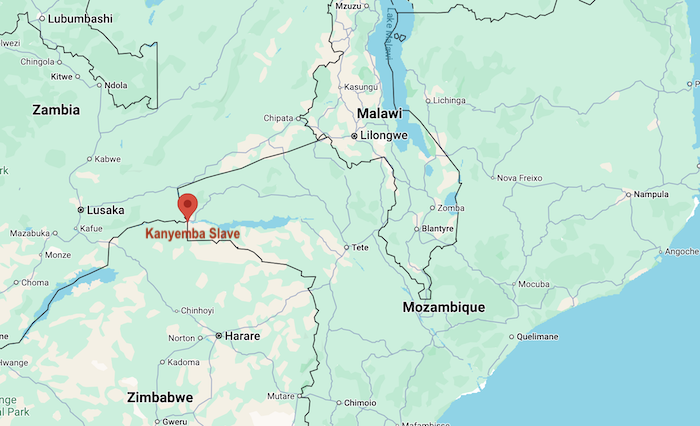
Slaves taken from Malawi, Mozambique, Zambia and Zimbabwe
Mozambique, Zambia and Zimbabwe connect at a place called Kanyemba (Zimbabwe side), Luangwa (Zambia side) and Zumbo (in Mozambique). Kanyemba is an island along the Zambezi River, at the confluence of Zambezi and Luangwa rivers and was used as a camp and transit point for slaves en route to the ocean. Before these countries were demarcated as they are presently, there were no borders, and their communities were one, although divided into Kingdoms. The Maravi Kingdom (present day Malawi) extended into present day Mozambique and very close to present day Zimbabwe.
Today, a stone structure that once served as a holding camp for captured Africans still stands, though in a dilapidated state but being renovated by the National Museums and Monuments of Zimbabwe. The camp at Kanyemba was dominated by Portuguese, Indians and Arabs and was strategically located to secure slaves and transport them to the ocean via the Zambezi River. It remains a powerful reminder of these countries’ role in the inhuman process of slavery.

In Zimbabwe, near Karoi, a line of baobab trees grows along what is believed to have been an old route used for the slave trade or for transporting copper from local mines. Oral stories suggest that enslaved people, given baobab fruit for strength, may have dropped the seeds along the path, which later grew into the trees still standing today. Copper crosses have also been found along this route—some say they mark graves of those who died and could not be carried, while others believe they were discarded by people who escaped. These crosses may also be connected to missionaries, some of whom were involved in both religious work and the systems that supported slavery. The baobabs and copper crosses remain as silent witnesses to this layered and difficult past, much of which is yet to be fully explored.
In 1794, the São José, a Portuguese slave ship, sank near the Cape of Good Hope. It was owned by Manuel José Pereira and captained by Manuel João, his brother. The ship was carrying over 400 enslaved people from a port in present day Mozambique to Brazil. The slaves had come from inland Africa, in areas of present day Mozambique, Zimbabwe and Zambia. The ship struck a rock, and while some survived, more than half drowned. The São José was one of the first ships on the Mozambique–Brazil slave route. East Africans were taken to work on sugar plantations in Brazil. Between 1800 and 1865, over 400,000 made this journey in harsh conditions. Cape Town became a key stop for ships involved in this human trade.
Near Mozambique Island lies the wreck of L’Aurore, a French slave ship. In November 1789, it left Mauritius for Mozambique to collect enslaved people for the French Caribbean. In January 1790, as more captives were boarding, the 356 already on board tried to resist, and four drowned. The crew then locked the men below deck and kept women and children in the main cabin. A month later, before the ship could leave, a storm hit. The crew delayed opening the hatch, and 331 enslaved people drowned.

Use the form below to subscibe to Owia Bulletin.
Discover more from Africa Social Work & Development Network | Mtandao waKazi zaJamii naMaendeleo waAfrika
Subscribe to get the latest posts sent to your email.


